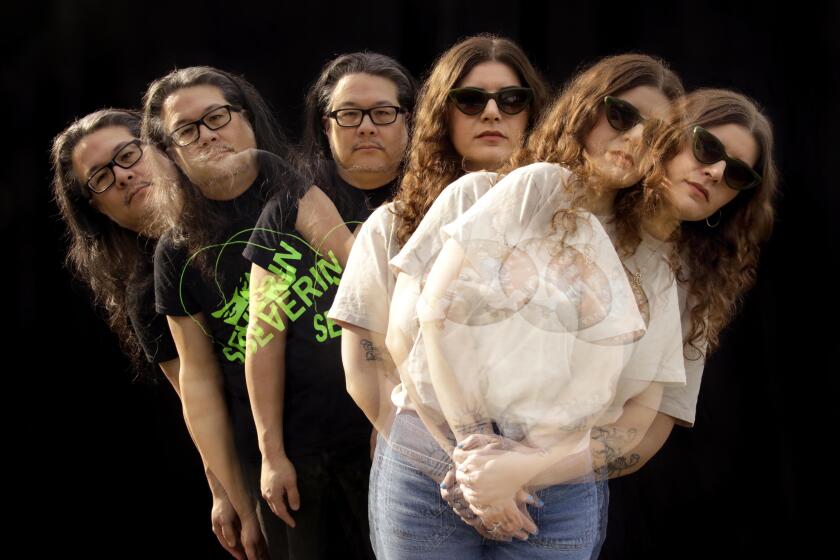The ‘cowboy hard’ life and songs of ‘Yellowstone’s’ Ryan Bingham
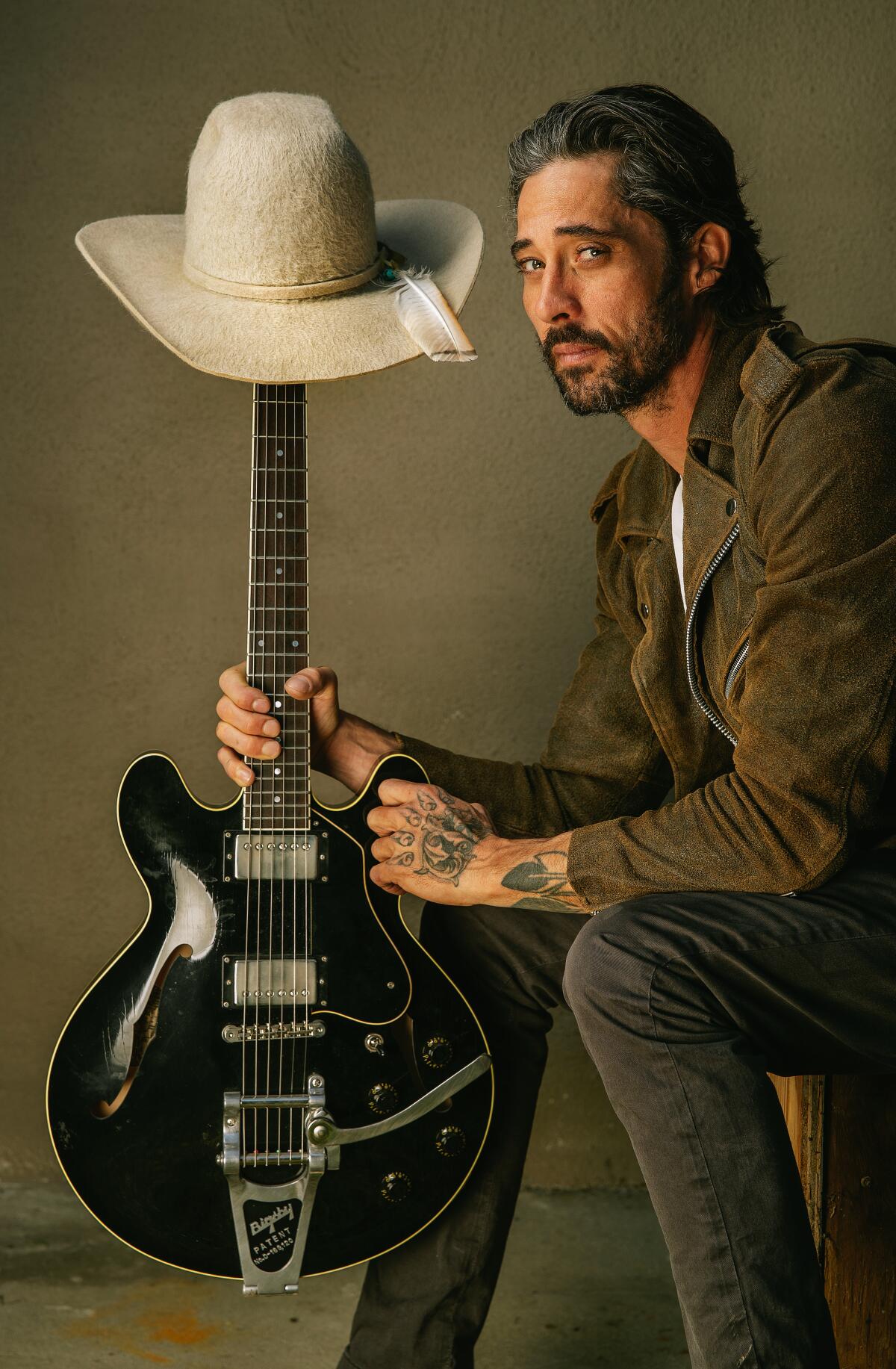
- Share via
The scene called for a live grizzly bear wreaking havoc on the outskirts of Yellowstone Ranch. The bear was tame. Its trainers were present. The cast was more or less chill about the whole thing. There was just one problem: the horses.
“Their natural instincts when they smell the grizzly bear is to turn and run the other direction,” says Ryan Bingham, the Academy Award-winning singer-songwriter who plays Walker, the lanky, sad-eyed singing cowboy on the hugely popular series “Yellowstone.” “To see all the cast, trying to hang on to these horses that are trying to run the other way ...,” Bingham says, laughing. “I had a lot of compassion for everyone on the set that day.”
As Bingham tells it, even when “Yellowstone” gets a little dangerous, it’s still fun. For all of the show’s heaviness, for all of the murders and near-murders (one of them involving Walker), the camaraderie is a constant, starting with star and executive producer Kevin Costner, who makes sure to shake every cast and crew member’s hand every day.
“We’re always joking backstage and things like that,” Bingham says via Zoom from his home in Topanga Canyon. “It’s interesting how light and fun it is when we’re on set and we’re playing around. People are chasing around horses and things like that. But then when you see the show, it can be pretty dark.”
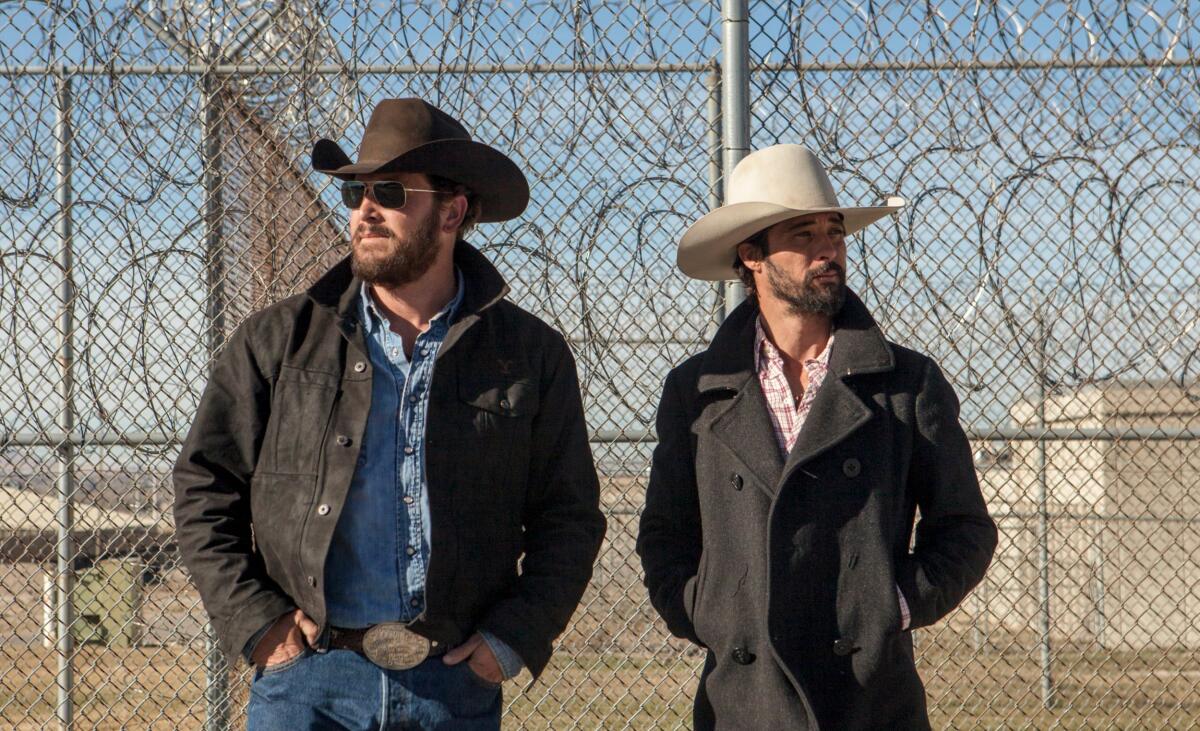
It’s a good metaphor for Bingham himself. He can ride a bull and play the kind of stomping rave-ups that fill his last album, 2019’s “American Love Song.” But he’s also seen his share of tragedy, including the death of both parents, his mother from alcoholism, his father from suicide. And his music has been known to make grown men weep. At 40, he’s been around. And you get the feeling he’s just getting warmed up.
Born in Hobbs, N.M., he grew up ranching and working in the oil fields with his family. His life itinerary sounds like the Johnny Cash song “I’ve Been Everywhere”: Bakersfield, Oildale, Midland, Odessa, Kermit, Houston, Laredo, Stephenville, Austin, Los Angeles. His mom bought him his first guitar for his 16th birthday, but he didn’t play it for a while. When his parents split and his father moved to Laredo, one of his dad’s friends there took him aside.
“He could play some really cool mariachi music and some of the Tejano and conjunto stuff,” Bingham says. “He taught me to play some mariachi music, and from there, I was hooked. That’s where it all started for me.”

Talk to people about Bingham and you hear variations on the same word: real.
Charlie Sexton remembers when he realized it. Bob Dylan’s guitarist, a sort of ambassador for Austin music, was playing with Bingham and several other musicians at an Austin benefit for victims of Hurricane Harvey in 2017. Sexton saw Bingham, whom he already knew a little, standing at the side of the stage, waiting to go on.
“I went up to him and I did that sort of fake punch you do sometimes to your buddies, you know?” Sexton says. “And he didn’t flinch. I told him, ‘That’s why I like you, Ry. You’re the real deal. You’re cowboy hard.’”
Sexton saw it again when Bingham tabbed him to produce “American Love Song.” “The way he went about writing when we were recording, it was a real bull-rider way where he just gets on it, stays on it, tries not to get thrown and just sees it through,” Sexton says.
For middle-class artists like L.A.’s Best Coast, touring means everything, financially and spiritually. An inside look at what’s lost when the show can’t go on.
“Yellowstone” co-creator Taylor Sheridan knew it before he even met Bingham. “I wrote [the movie] ‘Wind River’ listening to his song ‘Hallelujah’ on a loop,” Sheridan says via email. “To have him on ‘Yellowstone’ is a gift. He is the graveled voice of this generation’s cowboys and poets.”
Shortly after he learned those mariachi songs, Bingham started playing for tips on the bar circuit. “Before too long, I just started getting these little gigs,” he says. “And I would make 50, 100 bucks a night.” He captured these gigs for posterity on “Jingle and Go,” the first track on “American Love Song.” It’s a rowdy ode to playing for change — which, to hear Bingham tell it, was a luxury of sorts.
“Most of the time, I had to have some kind of day job, doing hard labor, construction or digging holes,” he says. “I could go to a little bar and make about the same amount of money in a couple hours as I did digging holes all day. That’s when I realized: I don’t know if I’ll ever make it or become anything, but if I could make 100 bucks a night playing in bars with my guitar, it’s a hell a lot better than digging holes.”
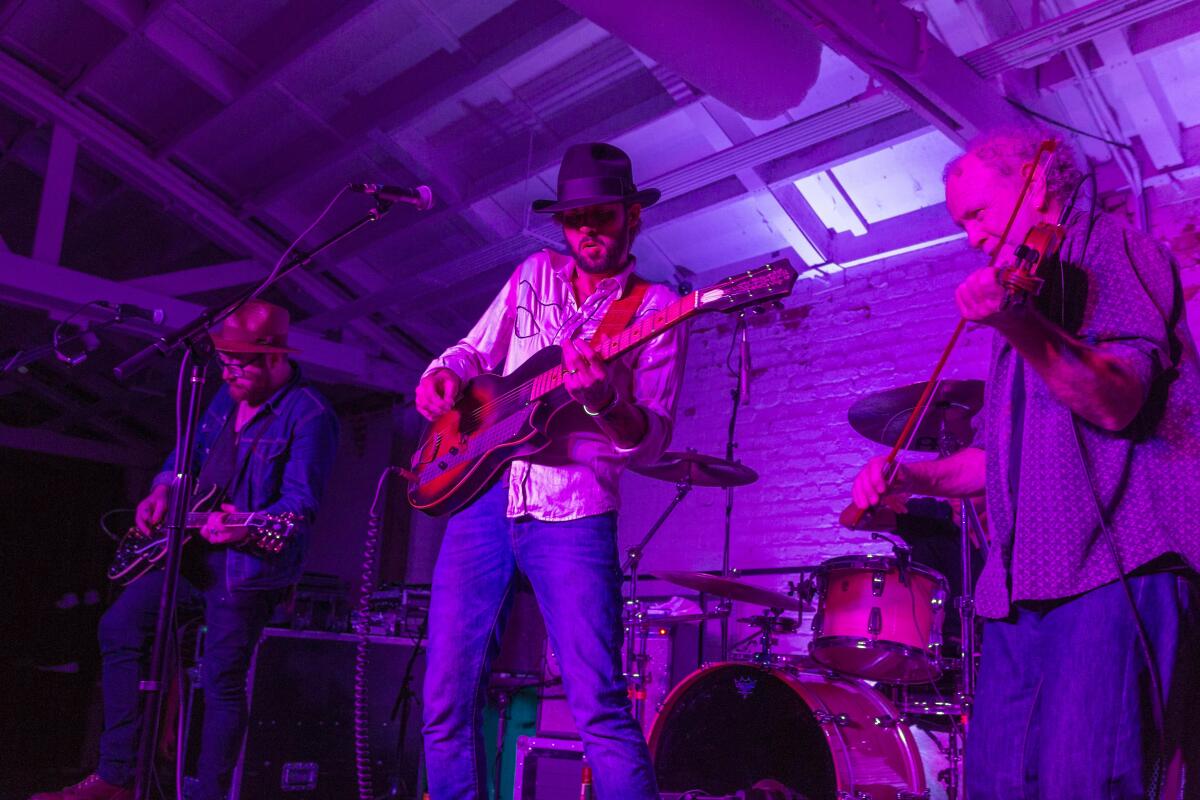
In short, Bingham has done a lot of living. And it didn’t get easier just because he got famous.
Right around the time he was collecting an Oscar for co-writing “The Weary Kind,” the signature song for the 2009 Jeff Bridges movie “Crazy Heart,” he lost both of his parents. More recently, he split from his wife of 12 years, the filmmaker Anna Axster. He gets through it the same way he gets through everything: by losing himself in music. When he was growing up, therapy was taboo: “Only crazy people went to therapy,” he says. So music became his therapy.
“I’ve tried to make a conscious effort to write lighter songs,” he says. “But when I’m having those hard times, it’s almost like I can’t keep it from coming out. I’ll just pick up the guitar and it just pours out. Then I record it, and there ain’t really no looking back. A lot of it, I try to leave on the page, but then I got to go sing it over and over. People want to hear the songs, and I got to relive some of that trauma too.”
Indeed, some of Bingham’s best songs are also his saddest. There’s “Never Far Behind,” written in the wake of his parents’ deaths: “How many times can I forgive you? / If you are always on my mind / I’ve tried so hard to outrun you / You are never far behind.” “There’s “Wolves,” written for school shooting survivors who bore the brunt of adult bullies: “There was no one comin’ around / To save me from the fray / I had to stand my ground / And keep the wolves at bay.”
“Wolves” is one of a handful of songs Bingham has performed in character on “Yellowstone.” His character, Walker, has had an intriguing arc.
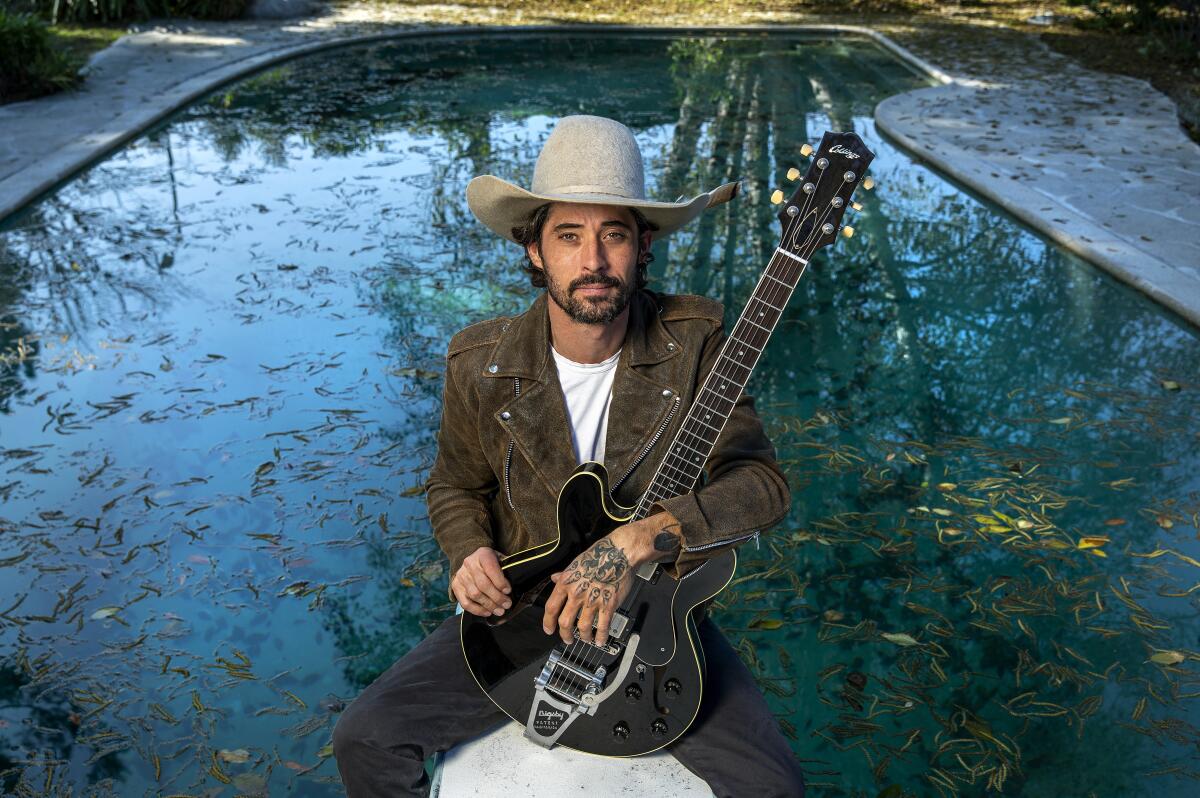
An ex-con drifter who knows his way around a guitar and a ranch, Walker is wary of Yellowstone. The feeling is mutual. Once he’s made an accessory to murder, the kind of thing that happens a lot on the ranch, he’s driven away with the promise that he’ll never show his face again. But he’s too good a character to stay gone. Walker is found performing in a bar (jingle and go), whereupon he’s whisked back to the ranch. Walker knows too much about Yellowstone’s dark doings; it’s either take his old job back or get a bullet in the head.
Being a secondary character on “Yellowstone” can be a dangerous gig, even if you used to ride bulls in real life. Bingham never really knows if he’ll be coming back until they tell him.
“You’re on a need-to-know basis, for sure. Sometimes you’ll hear from another cast member that they’ll be back, so you got an idea of when they’re telling us. I got the call recently and they said that they were going to start back up.”
That means Walker, and Bingham, will be back for Season 5.
Bingham is as surprised as anyone by the show’s unlikely cultural foothold. Critics often describe “Yellowstone” as that show their parents watch. It’s a show about cowboys, set in a very red state. It often feels like a soap opera — a very violent soap opera — for middle-aged men (although the most ruthless character, Kelly Reilly’s Beth Dutton, is a woman).
“It was a given that the western cowboy world would be into it, just because there really haven’t been many shows that portray the modern West,” Bingham says. “But I’ve got artist friends from New York City that I would never expect to be into the show, and they’re just all about it.”
Bingham chalks a lot of the appeal up to exoticism. That and real estate. It’s just not that easy to experience the wide open spaces of Montana, on TV or in real life.
“It’s a beautiful spot, and the way it’s shot is beautiful,” he says. “I think there’s still a lot of romanticism left in the world about that cowboy way of life. I meet a lot of little kids that grew up in the city and don’t really have the opportunity to get out into that part of the country and have that experience. I think people are still in awe of that in a way.”
Between takes, Bingham can often be found sitting under a tree, strumming his guitar as he waits for the action to resume. “On the set, he meshes in and has a great time,” “Yellowstone” executive producer David Glasser says. “You’re dealing with a guy who’s a rock star by night and an actor by day. But he takes it very seriously and comes prepared. He shows up with his A game.”
No matter how big he gets, you get the feeling Bingham will always have a little jingle and go in him. And he’ll always have a few wolves to keep at bay.
More to Read
The biggest entertainment stories
Get our big stories about Hollywood, film, television, music, arts, culture and more right in your inbox as soon as they publish.
You may occasionally receive promotional content from the Los Angeles Times.
